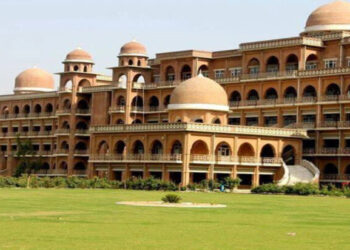ISLAMABAD: Chief of Army Staff (COAS) General Qamar Javed Bajwa on Saturday asserted that Pakistan does not believe in camp politics and seeks to expand and broaden its ties with both China and the United States.
Speaking at the Islamabad Security Dialogue, Gen Bajwa spoke about Pakistan’s relations with other countries, including the United States.
Amid concerns about a contestation between global powers, Pakistan was positioning itself as a melting pot for international economic interests by focusing on connectivity and friendship, he added.
“Pakistan does not believe in camp politics and our bilateral relations with our partners are not at the expense of our relationships with other countries,” the Army Chief pointed out.
He further said Pakistan enjoyed a close strategic relationship with China which was demonstrated by the country’s commitment towards the China Pakistan Economic Corridor (CPEC), adding, “Equally, we share a long and excellent strategic relationship with the US which remains our largest export market.”
He said that Pakistan sought to broaden and expand relations with both China and the US “without impacting our relations with either”.
‘Russian invasion of Ukraine must be stopped’
The Army chief expressed Pakistan’s serious concern over the Russia-Ukraine conflict and termed it a great tragedy, observing that Moscow’s invasion of Kyiv must be “stopped immediately”. “Despite legitimate security concerns of Russia, its aggression against a smaller country cannot be condoned,” he pointed out.
“Pakistan has consistently called for an immediate ceasefire and cessation of hostilities. We support immediate dialogue between all sides to find a lasting solution to the conflict,” he added.
General Bajwa further said the Russian invasion of Ukraine was very unfortunate as thousands of people had been killed, millions made refugees and “half of Ukraine destroyed”.
The army chief said the conflict gave hope to smaller countries that they could still defend their territory with smaller but agile forces against aggression by a bigger country by carrying out selective modernatisation of equipment.
He noted that Pakistan had enjoyed excellent defence and economic relationships with Ukraine since its independence but relations with Russia were “cold” for a long time because of numerous reasons. However, some positive developments in this regard had taken place recently, he added.
He cautioned that the continuation or expansion of the conflict would not serve the interests of any side, least of all the developing countries which would continue to face socio-economic costs of the conflict, which he said could “easily get out of hand”.
Gen Bajwa pointed out that there were two camps internationally — those who advocated contestation and those who advocated cooperation — and the future vision of security would be decided based on which camp prevailed.
Pakistan’s interests were served only when cooperation instead of contestation between power centres was promoted, he said, calling on the international community to support cooperative countries such as Pakistan rather than those who wish to gain from this contest.
Indian missile incident
During his speech, Gen Bajwa termed India’s “accidental” launching of a supersonic cruise missile into Pakistan on March 9 a matter of “serious concern”. “We expect India to provide evidence to assure Pakistan and the world that their weapons are safe and secure,” he said.
“Unlike other incidents involving strategic weapons systems, this is the first time in history that a supersonic cruise missile from one nuclear-armed nation has landed in another,” he said.
“We hope the international community will realise that this incident could have resulted in a loss of life in Pakistan or an accidental shooting down of a passenger plane flying along the path of the cruise missile,” Gen Bajwa said today.
He noted that Pakistan had called for a thorough probe into the incident, iterating that Pakistan had shown maturity and responsibility on its part.


































